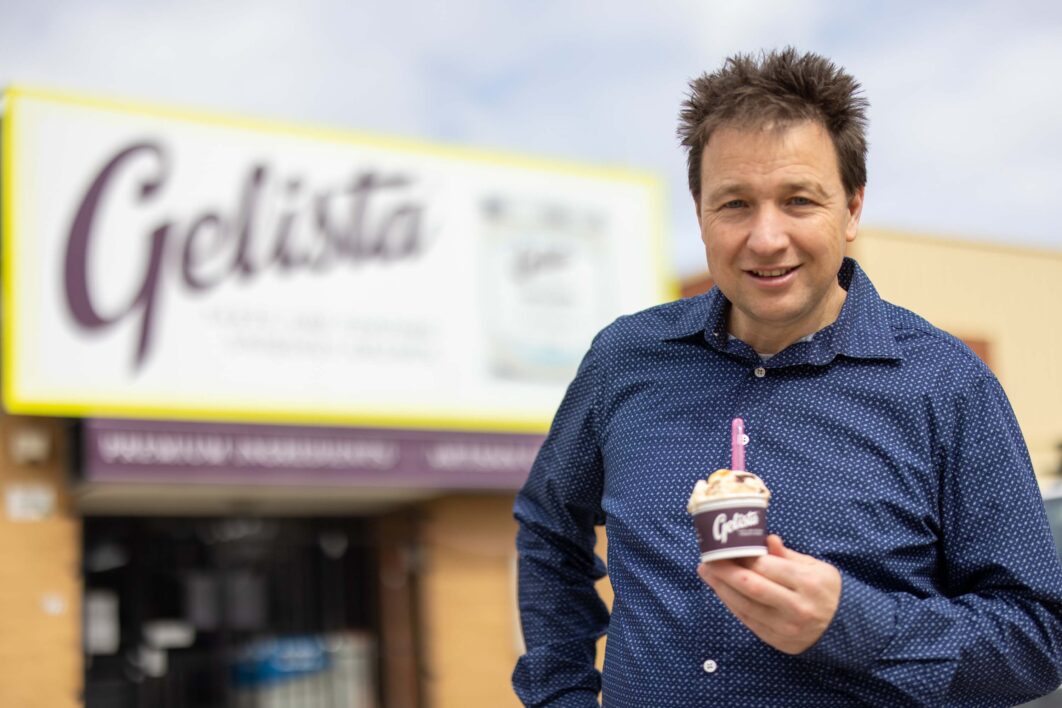Gelista is a well-known name in the artisan food world. And now the South Australian manufacturer of premium gelato and ice-cream products has settled in a new factory in Ridlleyton and has plans to export its range.
Owner and Managing Director Peter Cox, who grew up on a dairy farm and founded Gelista in 2009, says his original business vision was to create premium dairy products and support the Australian dairy industry, and this is still at the heart of Gelista.
The move to the new factory, which is double the size of Gelista’s previous base, was driven by strong demand for Gelista product.
“What we sold in one year in 2013 is about our average monthly sales today. Better marketing, continuous product and process innovation, and sticking to our core promise of indulging our customers has fuelled this growth,” Peter said.
“We began by making the Gelato that chefs wished they had time to make for themselves. We started out producing our wholesale five litre tubs for fine dining, function centres and cafes.
“In 2016 our range expanded to include the 570mL jar for supermarkets. We now produce more than 50 flavours in various packaging formats, supplying restaurants, cafes, hospitals, schools and independent supermarkets across Australia.”
Gelista’s original facility was built in 2013 and as the business grew, additions were made. “For the last few years, we’ve really been bursting at the seams. We were forced to warehouse 90% of our finished goods offsite,” Peter said.
“Now, the floor space in our storage freezer and production hall is at least double the size, allowing us to manufacture and warehouse all Gelista products in our own facility.”
The demand for Gelista product means more raw ingredients are required, and this is good news for dairy farmers. “Our demand for dairy as a raw material is up about 40% on last year,” Peter said.
“About 85% of our production is dairy based, so every increase in our volume essentially equates to another kilogram of dairy produce required.
“I grew up on a dairy farm, so I know how hard farmers work for their modest returns and I knew that I wanted to value-add to the Australian dairy industry.
“Australian dairy is well regarded as a superior product, so this, along with procuring real fruits, real flavourings and other ingredients makes it an exciting and dynamic business to be involved in.”
Peter said one of the most exciting aspects of the new factory was the process-flow oriented layout.
“We have designed our factory so we can make efficient use of the floor space. On a per-square-meter basis, I’m pretty sure the Gelista factory productivity would be one of the highest in the state because we make so much product in a small space,” Peter said.
“We’ve put the equipment where the ingredients are consumed, so that we are not manually handling product from one end of the factory to the other, which has improved the flow of product.
“Previously, a lot of our ingredients were transferred through the plant by hand. We’ve essentially eliminated 90% of that now. Reduced manual handling and increased automation means that we are manufacturing products to a much higher food safety and quality outcome than before.”
The factory also offers increased automation and robotics, including a Clean-In-Place (CIP) system for cleaning the ageing tanks and packing lines. “The CIP kitchen is where the cleaning fluids are dosed with correct chemical dosage rates automatically. Before this, we used to run buckets of water, and cleaning was very manual. This CIP system results in a more consistent approach,” Peter said.
“When we’re ready for the next stage, we can get valves with automated actuators rather than handles. Automation engineers can then write a program to switch pumps on and off, detect water movement, and check everything has been cleaned adequately, just by pressing a button.
“I’m still a small-scale manufacturer, but we’ve invested in some ‘nice to haves’ – some things to make our life a bit easier and to enable people to do more exciting things than run buckets of water for cleaning.
“Included in the shift is a central refrigeration system significantly reducing our energy input per litre of product manufactured.”
To encourage all staff to be involved in the food safety and work health and safety programs, weekly toolbox training sessions are held.
“As our team has expanded fairly rapidly, we considered it necessary to have a weekly get-together to discuss some important training aspects around quality and safety,” Peter said.
“These sessions have proved valuable as it has helped introduce staff to new features of our plant and calibrate all staff on correct Standard Operating Procedures.”
While Peter still considers Gelista to be a small-scale manufacturer, a long-term aim is exporting key products to selected international markets.
“I’ve always had the aim one day of exporting the Gelista brand. I want to keep expanding our footprint and build a stronger base in the Australian market, which will help us springboard into the international arena,” Peter said.
“But I want to balance our growth with retaining the artisan feels about our products. We use real ingredients, and traditional ways of making the product. We cook our own figs, we buy our raspberries from a raspberry farmer in Tasmania and cook up our own raspberry ripples, and mint oils are sourced from a family grower in the Riverina area.
“I’ve worked hard to develop strong relationships with Australian farmers to set up a great supply of premium raw ingredients.”
Read more about Gelista here.
